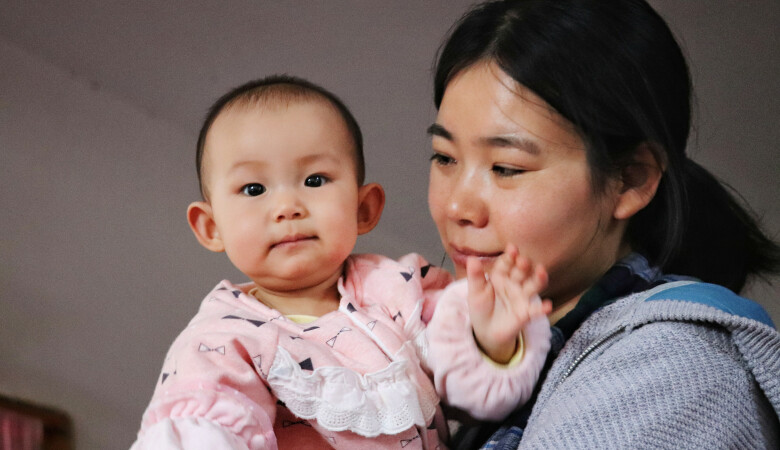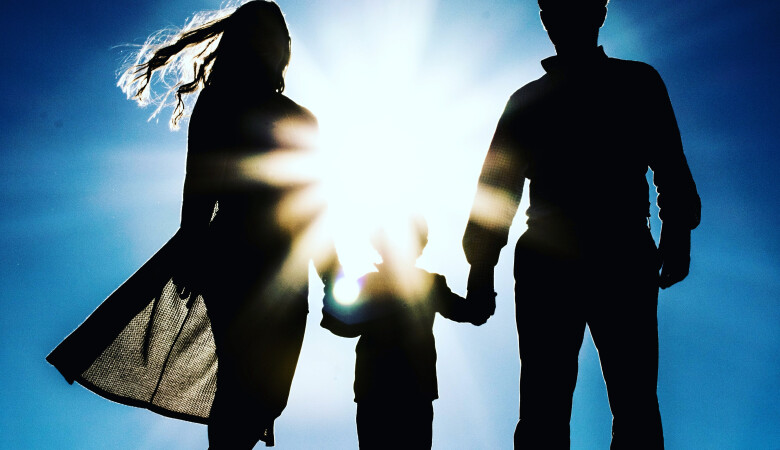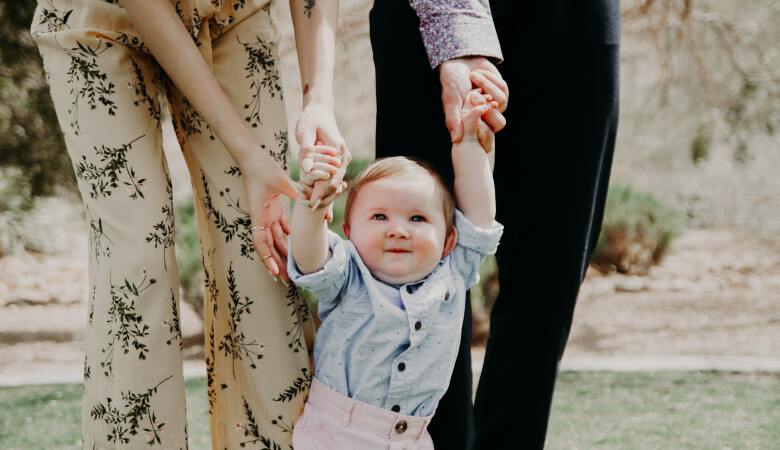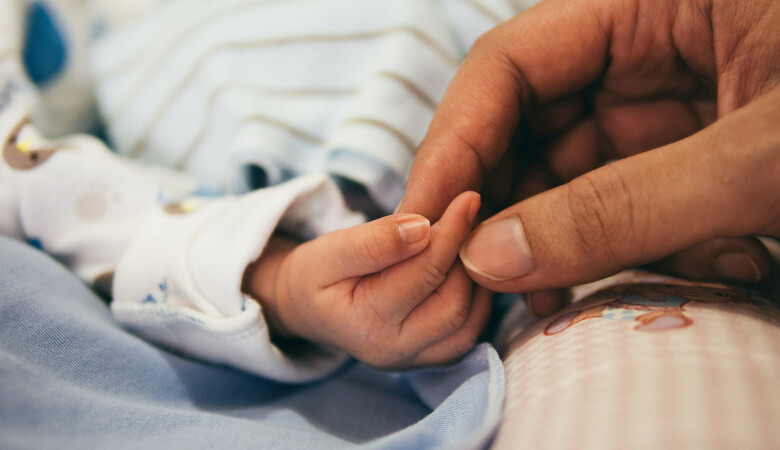Human Life Still Sacred in 2014... And Always Will Be!
January 19, 2014 | Andy Davis
Genesis 1:26-28
Sanctity Of Human Life
Pastor Andy Davis preaches an expository sermon on Genesis 1:26-28 and the fact that human life, created by God, is and always will be sacred.
- Sermon Transcript -
Today is Sanctity of Human Life Sunday. It's a day for us, I think, as a people to celebrate the great gift of life, to give God thanks for physical life and even more for eternal life, that we should be praising God for the joy of being alive. And it's a chance for us to renew our zeal for life and our thankfulness for children, just giving thanks to God for the gift of children and also to renew our zeal to protect children from the spirit of the age in which we live. You heard what I just prayed? And Jesus said of the devil that he was a murderer from the beginning, John 8:44. But the Bible says that children are a gift from the Lord, as it says in Psalm 127:3, "Behold, children are a heritage from the Lord. The fruit of the womb is a reward." And so we have a great reason for celebration every day, but as we focus on the sanctity of human life, we should do so with a heart of celebration. We also do so with a heart of grief. We're aware, in our country as around the world, the scourge of abortion and we should grieve over that.
The Sanctity of Human Life Sunday occurs in a January near the infamous Roe vs. Wade decision, January of 1973. So the Roe vs. Wade decision turned 41 this Wednesday. And since 1973, the deaths of more than 54 million children have been reported in the United States alone. Every year, approximately 1.21 million more unborn children are aborted, and that's a hard number to get a hold of this morning. I was reading one website that put it this way, the bloodiest day of battle in the military history of our country was Antietam during the Civil War, 1862. Twenty-three thousand people died altogether at that battle, and I can't even imagine what it was like to be in the various communities when the reports of that battle came back. But that's basically an Antietam every five days in our country. Every five days, 23,000 more, and it's just really a great tragedy, so it's a day of grief for us, a day of sorrow and also of repentance. Always for us to come back and say, Lord, show me my sin and turning again to Christ and receiving grace concerning our sins.
Thirdly, I think for us, it's a day of hope. As we look ahead to the future, I want us to do so with hope. Christians should be filled with hope. There is no sin pattern, there is no evil in this world, in this universe, that's permanent. Amen? Jesus is Lord of all. And so it happens that this day also falls near Martin Luther King Jr. Day, which is tomorrow, a day in which we celebrate one of the achievements of one of the great leaders in American history as he stood against injustice and institutional racism and for civil rights. And he, I think, had to be imbued with a special sense of hope, as well, because the odds were so great and it was so difficult, but for us, we have to face what I consider to be an even greater civil rights issue. I consider abortion to be the greatest civil rights issue of our day, the greatest since people were enslaved in our country. And whereas the Jim Crow laws unjustly deprived African Americans of rights and freedoms and access that others had, abortion deprives individuals of life, far worse in that way. And Dr. King, I think, Martin Luther King Jr. is an example of hope for us. We can be and should be, people of hope. We can imagine a day in which not only racism but abortion will be gone.
And I go beyond that, I look forward to the day when there'll be no sin at all, amen? No sin and we will be free at last and that's going to be the day of the kingdom of Jesus Christ. When Christ is openly reigning in the new Heaven and the new Earth will be free from all of those things. So Sanctity of Human Life Sunday, I think, is a day for us to celebrate life, to grieve over abortion and to look ahead with hope and with resolve. In many ways, we are winning this battle and we need to look at that. We are winning the battle for the hearts and minds of people.
"Sanctity of Human Life Sunday, I think, is a day for us to celebrate life, to grieve over abortion and to look ahead with hope and with resolve. In many ways, we are winning this battle and we need to look at that. We are winning the battle for the hearts and minds of people. "
In the last three years, more pro-life legislation has been passed in our country than in the previous 10 years combined. And so what that's doing is more and more displaying and also effectively helping to change the hearts of people, younger people, people in their twenties and more and more are against abortion. They see it for what it really is. Syndicated columnist Charles Krauthammer, who is not pro-life, talked about the changing attitudes toward abortion on the Fox News Channel as "The Story of the Year Culturally". Called it “The Story of the Year Culturally”, and he explained why the nation has become more and more pro-life. He said, "The fact that people are becoming aware of how late-term abortions are so near to infanticide, also how new technology and ultrasounds are giving people awareness of how much an infant has developed in the womb, so the movement has stopped in that direction, actually has reversed, especially among young people." So that's very, very encouraging. We should be encouraged. We are winning the battle on this front.
Now we know the bigger battles, the battle against sin universally, and that's something that will be fought until Jesus returns, we know that. But for us as Christians, the battle must be ultimately a battle concerning truth, especially scriptural truth, and so we wanna look to the Bible and we wanna look to truth and try to understand what God says. So it's just a simple outline. This is not an expositional sermon on Genesis 1, much as I'd love to do that. You know how I love to do that. But what I wanna do is just look at this issue of the sanctity of human life, I wanna ask five questions and seek to answer them biblically. First of all, what does the sanctity of human life mean? Secondly, what is life? And talk about that. Thirdly, when does human life begin? And fourthly, what are the implications of all of that for us as Christians? That's gonna be the application section of the sermon. And then fifth, I just wanna speak a word concerning guilt and overcoming feelings of guilt. I feel like all of us need to hear that word of grace, and so that's how I'm gonna end the message.
I. What Does the Sanctity of Human Life Mean?
So let's begin with this question, what does sanctity of human life mean? And I wanna begin with a painful personal story. Some of you know this story, a number of weeks ago I killed a horse. It's true. I was driving with three of my kids and we were at a four-way stop and it was dark and we accelerated and then suddenly right ahead of me was a horse's head straight on attached to the horse. Straight on, I could see both the eyes of a horse and I don't even think I had time to brake. And soon my windshield was crushed in and my car was destroyed. I've said this, a number of you, that the horse and my car took each other out of this world. So the car was gone and the horse sadly died there in the road and I felt very badly about that, but very grateful for the lives of my children and for myself. I was grateful that we were alive. I feel if we were going 40 or 50 instead of about 20, as we were, I don't know how we would have survived.
Well, what happened after that was a bit odd. I immediately called my wife and then called 911, and I was just sitting there, well not stunned but a little bit, and just trying to think of what had just happened. My window was down and this car came by on the other side with its window down. It was a woman, and I'm gonna try to get her tone of voice, if I can. "Did you call 911?" I said, "Yes, I just made the call." "Good, because if you don't, I will." And the window rolled up and she drove off.
By contrast, another person, another woman came a minute later and said, "Is everyone all right?" What a contrast! So that started to actually burn in me a little bit, that whole encounter, so much so that a few days later, as I was there at the men's Bible study. I got up and I just felt the need to do this. I wrote up on the white board, “People greater than animals”. I just feel like we need to say that in our culture today. I think it's a wonderful thing to love our pets, it's a wonderful thing, and I do not feel happy about having killed a horse, but I am so grateful none of my children were killed. So people are greater than animals, is that biblically true? Absolutely, it's biblically true. Jesus said it plainly in many different places. For example, in Matthew 10:31, he said, "Do not be afraid, you are worth more than many sparrows." Actually, biblically, that's an understatement. But there it is intrinsically, we are worth more than many sparrows.
"People are greater than animals – is that biblically true? Absolutely, it's biblically true."
And then he said a few chapters later in Matthew 12:11-12, he said to them, “If any of you has a sheep and it falls into a pit on the Sabbath, will you not take hold of it and lift it out? How much more valuable is a man than a sheep?" So this is a clearly a biblical theme. This is the sanctity of human life, that people are special. People are unique. They're sacred. That's what sanctity means, set apart unto God as special. Set apart unto God from creation. We are worth more to God than any other thing in the physical universe. So the word sanctity means sacredness, and this comes from the text you heard Ashok read for us at the beginning here in Genesis 1. Listen to verses 26-27 again, "Then God said, 'Let us make man in our image, in our likeness, and let them rule over the fish of the sea and the birds of the air, over the livestock, over all the earth and over all the creatures that move along the ground. [Verse 27] So God created man in His own image, in the image of God, He created him, male and female, He created them."
So there is a sacredness to the creation of man, male and female, in the Genesis account. The flow of the narrative seems to make the moment of human creation very special day one, day two, all the way to day six. God is crafting and shaping and preparing the world really for us. And then I think the climax is the seventh day in which God... I picture it, God in effect sitting down in the throne room of the universe, reigning over all things. But clearly the creation of man in his image is the pinnacle of physical creation. We are made with a special task. I find it in the verse that's up over the mission's map there, right outside the door. Habakkuk 2:14, it says, "The Earth will be filled with the knowledge of the glory of the Lord as the waters cover the sea." That's our job. That's our role. We are to fill the earth and subdue it and roll over it, and then know the glory of God that just it fills, the universe is filled with his glory, and it's our job in our minds, our hearts to know that glory and to praise him for it. And so we are given a special role in creation for that.
Now, Adam was created in the image of God, but also all of his descendants, we are also in the image of God. And so it says in Genesis 5, when Adam had lived 130 years, he had a son in his own likeness and in his own image, and he named him Seth. So we are in the image of Adam, Adam in the image of God, all of us in the image of God, and that's made very plain also after the flood. In Genesis 9:6, there God speaks these words, “Whoever sheds the blood of man, by man shall his blood be shed, for in the image of God has God made man.” So it's lasting, it's not just Adam, but the entire human race. And this is also established in the book of James. And there it says in James 3:9, "With the tongue we praise our Lord and Father, and with it we curse men who have been made in God's likeness." So our fall into sin did not remove the image of God. It definitely marred it or defaced it, theologians would say, but we are still in the image of God. So that's the essence of the sacredness, the sanctity of human life.
Now, you can say, what does it mean to be in the image of God? One theologian I was reading, Louis Berkhof, said there are five elements to us as human beings, being in the image of God. First the soul. We have a soul, and that has God-like attributes of simplicity and spirituality and invisibility and immortality. So we're like God in our souls. Second, the mind. Our ability to think and to reason and to choose is in the image of God, our minds. Thirdly, our moral nature. The fact that God-like attributes of goodness and righteousness and holiness and love, that's in the image of God. God has those attributes. Then there's the body, our body. Though God doesn't have a body, yet our body is part of us being in the image of God, so that if you were to injure, not kill but injure another person, you're attacking the image of God. And that's where the whole eye for eye and tooth for tooth came from because it is of significance even to remove an eye or take a tooth from another human being. That's a significant thing because we're in the image of God. And then finally, fifthly, man's position in the world is God-like. We rule over the world like God rules over us and over everything. And so those are the elements of the image of God, every one of us.
And we are given a special role toward creation that no other animal has, no animal, no fish has this role, the role of ruling over the earth and subduing it, etc. In Genesis 2:15, it says, "The Lord God took the man and put him in the garden of Eden to work it and take care of it." Or literally, to serve it and protect it. God provides for the needs of every living creature. It says that in Psalm 104. “He opens His hand, satisfies the desires of every living creature.” He feeds all the whales, and that's a big job. Tons of plankton every day, and God feeds them. But we take a bit of that role, too, when we care for domestic animals and feed them and protect them and nurture them, take them in from a storm and all that, and so we're acting God-like to our animals. It says in Proverbs 12:10, "A righteous man cares for the needs of his animal, but the kindest acts of the wicked are cruel." So animal cruelty is not God-like, that's not God's nature. Psalm 8 does a beautiful job of setting us properly in order. Psalm 8 says, " ." So God's majesty is set high and lifted up in Psalm 8. It ends the same way, "Oh Lord, our Lord, how majestic is your name in all the earth." The alpha and the omega of the Psalm is God's majesty. God is infinitely greater than man.
And then the Psalmist David goes on to talk about how the cosmos humble us. "When I consider the work of Your fingers, the moon and the stars which You have created... " When I look up at the sun and all that. It's important for us to realize the sun, the moon and the stars were not put under us for us to exercise dominion over them. We have no such authority, we have no power, we have no ability to do that. They are above us and they humble us. So David says, "When I consider those things, I think this thought, 'What is man that You're even mindful of them?'" But then we get the statement that God has made us a little lower than the angels and crowned us with honor and glory. Why? Because he put everything under our feet, the fish of the sea, and the birds of the air, and the beasts of the field, everything put under us. So I love that. Above all things, God's majesty. The cosmos humbles us, too, but we have a measure of glory and honor because we were put in charge of this physical earth. So that's what I think it means when we talk about the sanctity of human life.
And what that means, especially, is that it makes murder especially heinous. It's an attack on God, really. So the murder of another human being is an attack on God. "Whoever sheds the blood of man, by man shall his blood be shed, for in the image of God has God made man." And again, if you look at that James verse, it's not enough to just not murder. If you speak harshly against human beings, [James 3:9] "With the tongue we praise our Lord and Father, and with it we curse men who have been made in God's likeness." Not only should you not murder, you shouldn't even curse them, because they are in the image of God. So I think that's very, very significant. So that's the first question. What is the sanctity of human life?
"The murder of another human being is an attack on God."
II. What Is Life?
Then the second question is maybe even more complex. What is life itself? What do we mean by life? We're trying to celebrate life. Well, what is it? How shall we understand it? Well, first, let's just say this, life is amazing. Life is just amazing. One of the most incredible experiences I've had as a homeschooling dad is to teach my kids biology and have the opportunity of going through biology. I didn't like biology in 9th grade. All right, but I love it now. As a pastor, I love it because it just puts God on display. And life is just so complicated and yet so fragile. It really is very, very exquisitely complicated, and yet because there is death, it's fragile, too.
So how complex is life? Well, incredibly complex. Some of you are gonna like the next few minutes of the sermon, some of you won't. Okay? But I love this kind of stuff. I love looking at just the science and the amazement of the world around us, and especially when it comes to biology. The simplest free living organism that God made is a bacterium that lives in the digestive tract of primates, apes, and monkeys, and all that. It's the simplest one they found. It's got 580,000 base pairs of DNA and 482 protein coding genes. Now, a research team headed by a man named Dr. Craig Venter decided they were gonna come up with a computer model for the basic life functions of this bacterium, and so they read over 900 journal articles about this bacterium. I find it amazing there are 900 about this bacterium. But scientists, you get research grants, and off you go. Don't get me started on that one, but there it is. And so they're studying this, and in those 900 scientific papers, this research team, this computer bio-mechanical team, isolated 1900-specific parameters that seemed to govern how that cell operated. And then they broke it into 28 separate modules that governed functions that kept it alive. And then they modeled how they interfaced with each other and got the whole thing down to a 10-hour life cycle.
That's about how long this thing lives, 10-hour life cycle until it could reproduce and die. And it took a cluster of 128 computers networked together to model this one 10-hour life cycle of the simplest living organism there is. There is no such thing as a simple living organism. Life is immensely complex. Most biology textbooks begin with the paramecium. You remember the little guy, the paramecium? Vastly more complicated than what I've just described. Whereas that one had 482 genes, the paramecium has 39,642 genes. And not just the complexity of an individual single-celled animal or us, multi-, you know, organs and systems and all that. It's how we are in a vastly complex intricate web of life with other living organisms in this whole system. Humans can't really model it. If they try to get this self-contained ecosystem, it usually dies within a short time because it's hard to get everything exactly balanced, but God has balanced everything on this planet in a marvelous web of life. Life is amazing. Life comes from God. God, our God, is alive. He is the I Am. Tell them, God said this to Moses, "Tell them, I Am sent you."
I am the I Am. I always exist. I am the I Am. And so in Deuteronomy 5:26 it says, "What mortal man has ever heard the voice of the living God speaking out of fire, as we have, and survived?" Our God is the living God, as opposed to the dead gods of the nations that are really just figments of human imagination impersonated by demons. That's all the gods of the nations are. But our God is alive. And so it says in Psalm 96:5, "All the gods of the nations are idols, but the Lord made the heavens." The clearest statements on life is in John's Gospel. It says in John 5:26, "As the Father has life in Himself, so He has granted to the Son to have life in Himself." That's self-existence. And then John 1:1-4, "In the beginning was the Word, and the Word was with God, and the Word was God. He was with God in the beginning. Through Him all things were made and without Him nothing was made that has been made. In Him was life." In him... who's the him? In Jesus. All life is in Jesus, whether those living people know him or not. All life is in Jesus, and that life is the light of men.
So all living things are created by God. Revelation 4:11, "You are worthy, our Lord and God, to receive glory and honor and power, for You created all things, and by Your will, they were created and continue to have their existence." So all things exist in God and continue to have their existence, and not only that, but all things exist in Jesus. Colossians 1:16-17, "For by Him [Christ], all things were created, things in heaven and earth, visible and invisible, whether thrones or powers or rulers or authorities, all things were created by Him, and for Him. He is before all things, and in Him all things hold together." Now, there's a vast difference between nonliving things that God's holding together and living things that God is holding together. So nonliving things like basic elements; the rocks and water, and metals like gold and silver and lead, and things like fire, the sun, the moon and the stars, these are nonliving things. They were created by God for his glory, but they're not alive. Conversely, you have living things like grass and trees and porpoises, and butterflies and eagles and donkeys and human beings. We're alive. Now, life itself is a mystery, it's very, very difficult to define.
If you go online and try to get a definition, it's very hard. You can't really put it into words. So they usually talk about functions. Something that does the following six things is alive. It's really, really hard to do it any other way. And if it doesn't do these things, it's not alive, biologically. So made up of cells, able to adapt to environment, things like that. Able to promote its own survival, can reproduce, can grow and develop over time, can obtain energy from its surroundings in unique special ways like by photosynthesis or by consuming.
Now, Genesis 1 speaks of God creating living things of various kinds, plants of various kinds, and sea creatures of various kinds, and birds, and land animals and insects and beasts of the field, and just this amazing intricate array of kinds and types in the genetic code, and they reproduce along the pattern of their kinds. And all of it created by God, by the word of his power. God said, Let there be, and there was. Human life is the highest, most complex physical thing God ever made. The human brain has 100 billion neurons in it, 100 billion, that's the same number as the number of trees in the Amazonian rainforest.
And the interconnections between them equal the same number of leaves on those trees. That's in one brain. Scientific American recently did a study on the memory capacity of the brain, and they say if you use your full mental capacity, you would be able to memorize up to one-quarter of all of the printed material in the Library of Congress, in all the books in the Library of Congress. Most of you haven't reached that level. As a matter of fact, there was a Far Side thing that I came across. Gary Larson and I used to love that. What a weird thing, he had a weird way of thinking. But a kid with an unusually small head raised his hand in class and said, "Teacher, my brain is full. Can I be excused for the rest of the day?" So your brain will never be full. There's always more that you can take in, and more, you can learn. We are the most complex physical thing God ever made. And our physical life is a gift from God. As it says in Acts 17:28, "In Him we live and move and have our being." And we also ought to say, in the book of James, if it is the Lord's will, we will live and do this or that.
So if it's God's will, you'll keep being alive. It says in Daniel, Daniel chapter 5, God was so greatly dishonored by Belshazzar because he was worshipping the gods of iron and bronze and wood and stone. And Daniel says, “You did not honor the God who holds in his hand your life and all your ways.” So for us as Christians, we honor the God who holds in our hand, our lives and all of our ways. The highest form of life there is, is eternal life, and that eternal life comes to us through faith in Jesus Christ. It's very clearly asserted throughout the Gospel of John. John's writings, I think, are the clearest on life. It's a big theme with John, he loves to talk about life. And in 1 John 5:11-13, it says that, "This is the testimony, God has given us eternal life, and this life is in His Son. He who has the Son has life. He who does not have the Son of God does not have life. I write these things to you who believe in the name of the Son of God, in order that you may know that you have life."
"The highest form of life there is, is eternal life, and that eternal life comes to us through faith in Jesus Christ."
So that life comes through faith in Jesus Christ. Well, what is it? What's the essence of that eternal life? In John 17:3, Jesus said, praying to his Father, "Now this is eternal life, that they may know You, the only true God and Jesus Christ whom You have sent." Do you know him? Are you alive? Not just biologically, but are you alive to God spiritually? Have you come to faith in Christ? Have you trusted in Him? It is by our sins, we died. Romans 7, the law came, sin sprang to life and I died. The Apostle Paul said that. We are dead in our transgressions and sins, and it is Jesus alone and his blood shed on the cross that can cleanse us from all sins.
Are you alive? What is that life like? Well, you just go through John's Gospel and you find out. It's like having an abundance of the highest quality wine to celebrate at a wedding. It's John 2. It's like being born again. It's such a new transformed existence, it's like being born again, John 3. It’s like having a well of water inside you springing up again and again and refreshing you, John 4. It’s like being born blind, John 9, and suddenly you can see all the colors of the universe in their radiant, John 9. It's like John 6, having a continual feast through the flesh and blood of Jesus. Because he died, we can feed and get energy and joy from Christ crucified and resurrected. It's like having rivers of living water inside you flowing out, blessing other people. That's what life is. And it will never end. Death will not stop it. Because in John 11, Jesus said, "I am the resurrection and the life. He who believes in me will live even though he dies, and whoever lives and believes in me will never die. Do you believe this?" He asked, do you? Because if you do, you'll live forever. So we don't need to fear the ending of biological life. That will come if the Lord doesn't return in our lifetime. You will biologically die, but you will live forever, and someday he's gonna give you a new body, a resurrection body, and in that, you will live forever. So that is the gift of life.
III. When Does Human Life Begin?
Now, let's ask this question. When does human life begin? Thirdly, when does human life begin? Well, at the center of this abortion debate is this issue of personhood, when does human life begin? The personhood of the pre-born is everything in this debate, it's everything. If the pre-born infant is just a conglomeration of cells, then it really is a private decision between a woman and her doctor to have it removed, no different, frankly, than a benign tumor being removed from inside the body. It's elective. It's up to you. It's not threatening you, but you can have this decision and you can make this decision, that's all it is. But if the pre-born infant is truly an identifiable and genetically separate human being, it should be protected by the laws of the land. It's no longer a private decision. It's no longer a woman's right to choose. Some have suggested... and I like this, the toddler test. The toddler test. Treat the child inside the womb like you would a toddler, okay? And whatever you can do or should be able to do in reference to the toddler, then you can do to the child inside the womb.
"If the pre-born infant is truly an identifiable and genetically separate human being, it should be protected by the laws of the land. It's no longer a private decision. It's no longer a woman's right to choose."
Now, let me ask a question, does it really make a difference in reference to the two-year-old, how he or she was conceived? What if that child was conceived by rape? What if that child was conceived by incest? What if that child was an unwanted child, an unwanted pregnancy? Do you see? The toddler test means everything. If that child's a human being, killing it is not an option. Not an option. It's very, very important for us to set that up and be very clear on it. I don't like politically expedient answers. We need to go to the truth, and the truth is that child is human from conception. Now, how do you know that? How can we know that? Well, the Bible goes there first and tells us, and science is now telling us, too. So let's do Bible first because it's far more important. In Job chapter 10:9-12 and also in Psalm 139:13-14, we have clear evidence of God's direct activity in forming the human being inside the mother's womb. He is actively involved. Though from a human perspective, there are many accidental children, from God's perspective, there are none. Can you imagine God saying to the couple, "Look what you made me do. I had to make this human being because you did this."
It doesn't work that way. God gives that child its form physically and also its eternal soul. God doesn't do that accidentally. It's an activity of God inside the mother's womb. Job 10:9-12, "Remember that you molded me like clay. Did you not pour me out like milk and curdle me like cheese? Did you not clothe me with skin and flesh and knit me together with bones and sinews. You gave me life." Psalm 139:13-14, "You created my inmost being, you knit me together in my mother's womb. I praise you because I'm fearfully and wonderfully made. Your works are wonderful. I know that full well." So God's directly involved in crafting every baby inside his or her mother's womb. It's marvelous. But does that mean it's human from conception? Well, again, there's Scriptural indications. Let's talk about the negative side, sinfulness. It says in Psalm 51:5, David said this, "Indeed I was guilty when I was born. I was sinful when my mother conceived me." Very significant. And again, Psalm 58:3, "Even from birth, the wicked go astray. From the womb, they are wayward and speak lies." All right, that's talking about the doctrine, the biblical doctrine of original sin.
It's clearly described for us in Romans, chapter 5, when Adam sinned, the whole human race sinned in him, and we were all condemned as sinners because we are sons and daughters of Adam, we're human. That settles the humanity of conception. From the moment of conception, we're sinful because we're human. And so from that very moment. And then as the baby develops inside the mother's womb, that we have even capacity, biblically, we have this... and when the pregnant Mary, pregnant with Jesus, went to visit the pregnant Elizabeth, pregnant with John the Baptist, and the two of them had an incredible time together, a special time. And we know this in Luke 1:44, John the Baptist leaped inside Elizabeth's womb when the greeting of Mary reached Elizabeth's ears. Luke 1:44, "As soon as the sound of your greeting reached my ears, the baby in my womb leaped [and here are the keywords] for joy." Joy is a personal trait, it's a human trait, and John was really excited to be near Jesus. Ah, wait a minute. Now, where was Jesus in His fetal development? Very, very soon after conception. And so in the verse before that, Elizabeth says, "Why am I so favored that the mother of my Lord should come and visit me?" So the Lord is already there in the womb.
She's already a mother, Mary is, and not just a mother of anybody. We’ll see how it turns out, “mother of my Lord.” Friends, I just think biblically that settles it. Amen? I don't think there's anything else to say from conception biblically. But we're seeing this more and more scientifically. Oftentimes scientists think that they have arguments against biblical truth. I don't think they ever do. I love both science and the Bible. I am a scientist who's a Christian. You don't wanna reverse that, trust me. I'm from Boston. You don't wanna be claiming to be a Christian scientist. But I am a scientist who loves Christ. Let's do it that way. So science seems to be against some aspects of the Bible. It never is, but it's especially on our side in this one. Fetal development and all that, it just points to the personhood of the pre-born. Eighteen days after conception, the baby's heart starts to beat.
Ron Halbrooks uses that a lot. Two hearts beating, two people in the room. It's just that simple. All right, that's after 18 days. Most women don't even know they're pregnant. Twenty-one days, the heart pumps its own blood of its own blood type through a separate closed circulatory system. By 28 days, eyes, ears, respiratory systems have begun to form. Forty-two days, brain waves recorded, skeleton complete, reflexes present. Seven weeks in, photos of babies sucking their thumb. Eight weeks in, all bodily systems are present, but still developing. Nine weeks, the baby is able to squint, swallow, move tongue, make fist. Make a fist. That's a little scary, all right? Find out about that later. We're not going into parenting right now. This is just fetal development. Eleven weeks, spontaneous breathing movements, has fingernails, body systems are working, all of them. Twenty-three weeks in, 15% chance of viability, that number is probably better. These are a little bit old, these stats, 23 weeks in. That's always getting better and better. We have some amazing doctors that have even been members of this church that are involved in that. It's amazing to see, and some have benefited from their premature babies being so carefully cared for and able to survive. So science is helping to win the day.
You've seen those incredible ultrasound pictures. We actually have a framed ultrasound picture of... Daphne, is it? Okay. I think it's a little creepy, but others like it, but I think... we have better pictures of Daphne. I'm not saying you're creepy, honey. I'm not saying that. She is not pleased. She's not pleased. Help me later. Go talk to her and tell her, it's all good. So the ultrasounds really do help women to see exactly what's happening and who it is that... and Michael Card put it in a beautiful song, "The face is familiar though I've never seen it." Powerful. Face is familiar though I've never seen it, and sometimes the women they just like, it's very, very hard at that point to even consider abortion.
V. What Are the Implications for Us as Christians?
Fourth, what are the implications for us as Christians? Well, this truth has consequences for us. If human life is sacred and if human life begins at conception, then implication number one, Christians should hate abortion. We should be set against it. It should cause us revulsion. Our study of the Bible on this, our study of biology, on fetal development, all of this settles forever the humanity of the pre-born. We should hate what abortion does to the primary victims of abortion, and that's the babies themselves.
"If human life is sacred and if human life begins at conception, then implication number one, Christians should hate abortion."
We should hate it, but we should also hate what abortion does to the women who get them. They are scarred in many cases, scarred deeply, emotionally, psychologically. I don't wanna say for life, because I believe the grace of God can heal that, can heal that, but there's this deep scarring that goes on. We should hate what abortion does to every doctor and nurse and technician and secretary and advocate and politician and judge in our country, how it hardens their hearts against a spiritual truth in many profound ways. It sears the conscience and hardens the heart. We should hate abortion all over the world. We should hate abortions done for gender selection in China and India and other places.
We should hate how abortion twists the minds and hardens the hearts of people. Our country's schizophrenic. I just talked about how premature babies can be rescued and protected, but in the same hospital also aborted. It just doesn't make much sense. In some states, a pregnant woman driving to the abortion clinic, if she gets in an accident and the baby dies, she lives, the driver can be charged with manslaughter in reference to her child. But if that doesn't happen and she continues, she can go ahead and abort the child. It's schizophrenic. It doesn't make sense. It twists, like it says, "A bribe blinds the eyes of the judge and twist the minds of the righteous." That's what abortion does. It twists our nation, makes us strange-thinking.
Implication number two. Christians should never get an abortion. Christians should never get an abortion. One of the most tragic aspects for me in studying this are the statistics of the number of babies that are aborted to women who claim to be born again or members of evangelical churches, 110,000-125,000 a year. That's a lot of babies. Percentage-wise small but still just a huge number of babies. So I thought about, why does this happen? And it moves in two different directions. I think first, there's greater shame for sexual sin in the Christian community, so there's more of a desire to hide and to go underground, whereas there's not as much out in the world. There should be, but there isn't. And second of all, there's a misuse of grace. Satan misapplies grace and changes it into a license for sin. And he's always doing that, he's always switching the two. So that before you've committed the sin, it's like, "Oh, God will forgive, God will forgive." Then after you commit the sin, "God will never forgive." He does exactly opposite of what grace actually does. Ahead of time, God warns us not to sin, and is gracious in that way. I'll talk more about that in a moment. But afterwards, he cleanses us.
So we have to be sexually pure. We live in a highly-sexualized culture, and we need to be sexually pure. We need to protect our hearts and minds. Sexual purity among teens and on college campus is stunningly low and it's mocked actually. Virginity is mocked. The church needs to help young people not lead themselves into temptation sexually. Willing to tread on some toes here, but I want to warn you against recreational dating. I wanna warn against recreational dating. What do I mean by that? Dating just to date. Whatever you call dating or courting or whatever, the purpose of a young man and a young women getting together is to answer a question, "Should we be married or not?" If that's not even on the radar screen, don't pair up, because all you're gonna do is lead yourself into temptation. Joshua Harris wrote a good book, "I Kissed Dating Goodbye". And I think parents need to read this book before permitting minors to date. People who have no intention of getting married need to consider this, read the book and just save yourself and protect yourself until it's time to get married.
Now, I was asked recently, "Well, how do you know?" It's like when the time comes and the young man is able to support a wife, young woman, they're ready to be parents and all that, then you get together, you spend time together. It's dating, courting, whatever you call it. But you're answering that question. Kevin and I have talked a lot about this. We both feel very, very... we're in complete agreement. He sent out something to the youth saying, basically, a young man and young woman shouldn't do anything that they wouldn't do with their sister or brother, right? Sister or brother. I put it with my kids, "Anything that you'd be uncomfortable seeing me do with a woman, don't you do that with one another." So you know, there are hugs and then there are hugs. Okay?
So, let's be careful. All right, sexually, okay? Grace says no to sin. Titus 2, "The grace of God that brings salvation has appeared to all men. It teaches us to say no to ungodliness and worldly passions and to live self-controlled, upright and godly lives in this present age." Grace also covers us when we do sin, more on that in a moment.
Implication number three. Christians should pray daily, actively, for an end to this abortion scourge. God can do it. God's done greater things than this. It's greater to raise Jesus from the dead. Amen? Greater. It's greater to save you from your sins. So let's pray. It says in Matthew 21:22, "If you believe, you'll receive whatever you ask for in prayer." So let's believe and trust Him for that.
Implication number four. Christians should persuade others concerning abortion. This is where it gets tough, but speak up. Be willing to speak to relatives and coworkers and neighbors and others when the issue comes up. Now, this is not more important than the gospel. The gospel is more important than this, but when it comes up, be willing to speak up. And we've got resources available. Kevin mentioned it and we've got these cards that we put for some websites you can go to. We've got books in the North Tower Resource Center. Stock up your arsenal of your mind and so that you're able to give good arguments and good defenses for pro-life. Be willing to speak up. Be willing to be a fork in someone's road. Be willing to speak up.
Implication number five. Christians should care actively for women in crisis pregnancies. We have the baby bottle blessings and we'll hear about that in a few minutes, but I do have another half hour to go, don't I? I don't? Just kidding. That wasn't my reasons for the time change. I want you to know that, but it says it's only 18 out here. So anyway, I'm finishing, I'm finishing real fast, real fast. So we should get actively involved. There are excellent, not just here in Durham, but in Raleigh as well, crisis pregnancy centers that could use your time, energy and money. Let's give ourselves to that. It is not true that the pro-life cause doesn't care for the women. That's why we're winning. It's because we have shown active care and concern for the women themselves and not just for their babies.
Implication number six. Christians should seek to change abortion laws. And I make it plural, not the big, necessarily the big one, but just chop, chop, chop, chop, little by little, abortion gets harder and harder to get access to. There's more and more regulations on it, etc., and then just... they know what's happening. The pro-aborts know that that's what's going on. This is a good strategy, and it's reflective of the change of minds and hearts of the American people. So we should keep praying for that, and more and more restrictive laws, more and more laws like the one passed in Minnesota this past year, requiring women seeking abortion to look at an ultrasound of their baby. And it's funny. In medical areas, you always want more relevant information, as much relevant information as possible, and on this one, they don't want it. I know why. Okay?
VI. How Do I Overcome My Guilt?
All right, finally, how should I overcome my guilt? How do I overcome my guilt? There's plenty of guilt in this, plenty of guilt. There are sins of commission, things that people have actually done in this area, women that have actually gotten abortions, men that have urged women to get abortions, and so it has happened. Medical personnel who have been involved in the abortion industry. Lawmakers, politicians, judges, others have actually done things in this area and they feel guilty. And then there are sins of omission. Failing to get involved, failing to speak up, failing to give financially, failing to sacrifice your time to help in certain ways, just not doing things God would have you do. There's plenty of sin to go around, and so for me, this is just whenever there's those feelings of conviction and guilt, they should lead straight to the cross. It's not good to say, "I'm not guilty, I'm just feeling guilty." No, we're guilty because we violated God's laws. What we need to do is go to the cross and realize God sent his Son to die on the cross for all manners of sin and blasphemy, all manners of sin that can be forgiven by the blood of Jesus.
So let's run to the cross. Let's find forgiveness there. Christ redeemed us. Have you heard this? From the curse of the law by becoming a curse for us. Praise God. In Him, Ephesians 1:7, "We have redemption through His blood, the forgiveness of sins." What about my regrets? Bring them to Christ. Regrets are helpful now. Memories are helpful now. But you'll have no shame and no regrets after Judgment Day. When you go to Heaven, there'll be no more death or mourning or crying or pain. Nothing will cause you any misery, no psychological pain, no emotional pain. We'll be free at last. In this life, we need those pains, we need those painful reminders, so we don't sin again. But in Heaven, you don't need any pain. We'll be free from it forever.
Close with me in prayer. Father, we thank you for the Gospel of Grace, and we're able to stand and look at the spirit of the age, the enemy that's against life and against the gospel and against human beings. And we are not afraid. We thank you, oh Lord, for the joy of the gospel. We pray that these words would take root in our hearts and transform our lives, in Jesus’ name. Amen.
















